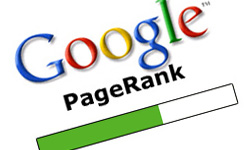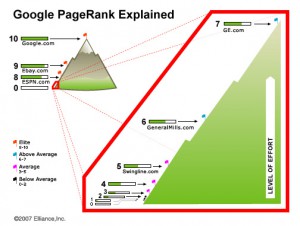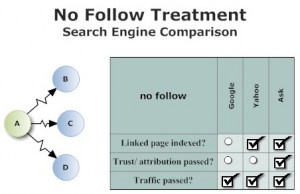 Everybody is thinking of it, yet (almost) nobody knows how it works. Google PageRank is certainly the one of the most significant algorithm developed for the web. The search issue is more intricate than web probably think of it is as there are billions of pages already are and millions are introducing everyday. PageRank, only one of hundreds of factors used by Google to find best search result and helps to keep our search on Google clean as well as efficient. But actual working of Google PageRank is just a imagination for us. In this article we’ve put a focus of the fact – Google PageRank!
Everybody is thinking of it, yet (almost) nobody knows how it works. Google PageRank is certainly the one of the most significant algorithm developed for the web. The search issue is more intricate than web probably think of it is as there are billions of pages already are and millions are introducing everyday. PageRank, only one of hundreds of factors used by Google to find best search result and helps to keep our search on Google clean as well as efficient. But actual working of Google PageRank is just a imagination for us. In this article we’ve put a focus of the fact – Google PageRank!Here is our research having tons of facts and suggestion about PageRank, which seem to be right in actual practice.
Google tries to find pages that are both reputable and relevant. PageRank is only one of the several methods that Google uses to determine the relevancy and importance of page. Google uses over 200 signals to decide the page’s rank within their index database. Although PageRank is one of the signals, the PageRank calculation is not actually used to index page, that’s the job for other parts of Google search algorithm.
How Does PageRank Work?
• PageRank is just only one of several methods that Google uses to determine a relevancy and importance of webpage.
• Google interprets a link from page A to page B as a vote, by page A, for page B. Google looks not only at the absolute volume of votes; among 100 other aspects it also analyzes the page that casts the vote. In the PageRank calculation there aren’t 100 other aspects, the formula calculates links, that’s it.
• PageRank is based on incoming links, but not just on the number of them – relevance and quality are more important. PageRank doesn’t calculate the relevance and quality of webpage. You should try to obtain relevant, quality inbound links to your website, but determining relevance and quality is depends upon contents.
• PR(A) = (1-d) + d(PR(t1)/C(t1) + … + PR(tn)/C(tn)). That’s the equation for calculating the PageRank of webpage.
• All links are not weighted as the same when it comes to PR.
• If you had a web page having a PR8 and had single link on it, the site linked to would get a fair amount of PR value. But, if you had 100 links on that page, each individual link would only get a fraction of the value.
• Bad incoming links don’t have impact on Page Rank. The PageRank calculation does not understand what is good and bad, it just calculates a value for that page.
• Page Rank considers site age, backlink relevancy and backlink duration. Site age and relevancy are ranking factors, although backlink duration is a factor. Just as you can accumulate PR through links, it can also be reduced when links are removed.
• Contents are not considered when PageRank is calculated. PageRank is just determined for each page. It doesn’t count for a whole website.
• Each and every inbound link is important to the overall total. Banned sites are doesn’t taken into account.
• PageRank is a floating-point number, so it doesn’t range from 0 to 10. PageRank is supposed to be calculated on a logarithmic scale.
• Google calculates pages PRs once every few months. Actually it’s calculated all the time.
Impact on Google PageRank
• Frequently updating into content doesn’t improve PageRank automatically. As stated above contents are not part of the PR calculation process. But Adding new pages can decrease PageRank.
• Higher PageRank doesn’t mean higher search ranking for search result.
• DMOZ and Yahoo! Listings as well as .edu and .gov sites don’t improve your PageRank automatically.
• Wikipedia links don’t improve PageRank automatically, but pages which take out information from Wikipedia might improve PageRank. Great content will earn you links, but not PageRank. Links having “nofollow” attribute don’t contribute to Google PageRank.
• Proficient internal onsite linking has an impact on PageRank. When developing a website, you should strive to make it search engine friendly and especially Google-friendly by ensuring that your site does a good job of linking to its internal pages. Incoming Links from popular sites are important.
• Related high ranked web-sites count stronger. Ideally you want to acquire links from pages with a high PageRank, but again, the backlink to related sites does not have an impact on PageRank. PageRank is impacted by the links to and from high quality websites.
• Multiple count to one link from the same page cost as much as a just single count. Links don’t give PR away, they are just votes.
What is PageRank?
PageRank is only one of the methods that Google uses to determine a page’s relevance and importance. (PageRank Explained Correctly)
Google uses many factors for ranking a webpage into index. Of these, the PageRank algorithm might be the best known. PageRank is probably the most discussed topic by Search Engine Optimization (SEO) experts. PageRank calculates two things: how many links there are to a web page from other pages, and the quality of the linking sites. PageRank has only ever been an approximation of the quality of a web page and doesn’t do anything such as measuring of the topical relevance of a web page. It is calculated by the link context and on-page aspects such as keyword density, title tag, and everything else.

Google mingles PageRank with complicated text-matching techniques to find how much pages are both important and relevant to user’s search query. Google examines all aspects of the page’s content (and the content of the pages linking to it) to determine if it’s a good match for user’s queries or not.

Ranking Factors (related to PageRank)
• Efficient and relevant internal onsite linking is important. Internal linking is important to your overall ranking. Make sure your linking structure is easy for the spiders to crawl and index. Most suggest a simple hierarchy with links no more than three clicks away from your home/index page.
• Anchor text is also important. The anchor text of a link is often far more significant than whether it’s on a high PageRank page. The more specific is the reference, the better Google can evaluate it and consider it in relates search queries of user.
• Google penalizes excessive linking. Google is only concerned with pages of over 100 outgoing links. Google considers overly linked pages to be link farms, and they are penalized as such.
• Headers strong tags and semantic content are vital. It doesn’t improve PageRank but decides the page relevancy. Place it in the description and meta tags, but keep your content clear and useful. Be aware of the text surrounding your keywords, search engines will become more semantic in the coming years so context is important.
• If you really want to know what are the most important, relevant pages to get links from, overlook PageRank. Think about search ranking. Search for the words you’d like to rank for. See what pages come up tops in Google. Those are the most important and relevant pages you want to seek links from. That’s because Google is clearly telling you that here are the best topics you are searching for.
Google Tools & Services
• Google Quality Guidelines
Here are quality guidelines that cover the most common forms of deceptive or manipulative behavior, but Google may respond negatively to other misleading practices not listed here.
• Check if your site is in Google database
• Re-inclusion request form
Request re-inclusion of a site that has violated the webmaster guidelines
• Google Tools
A ample overview on Dmoz.org.
